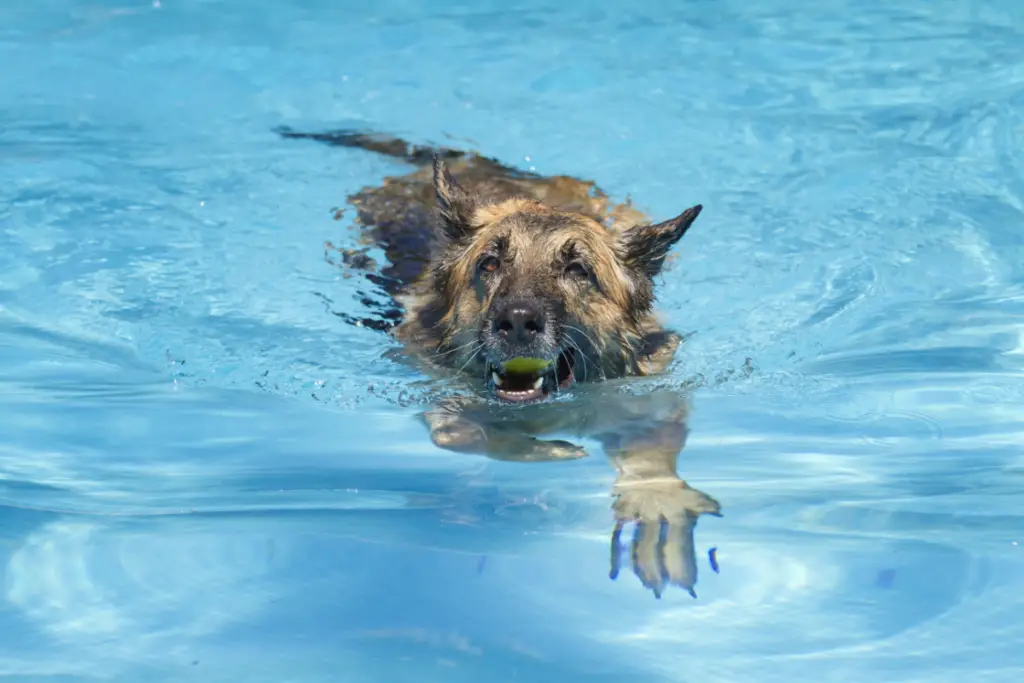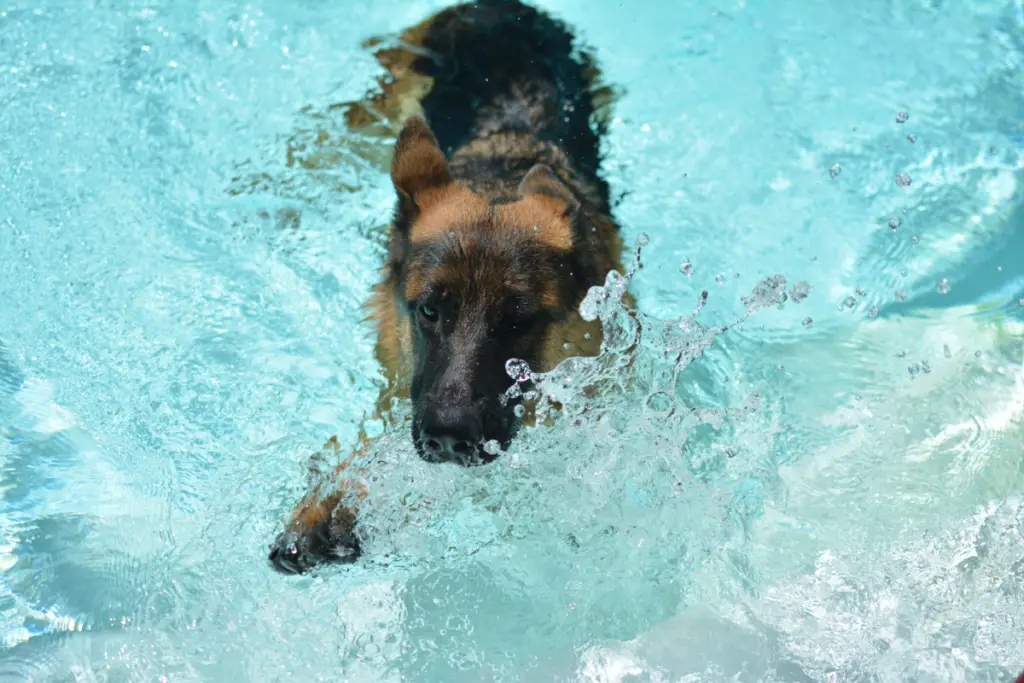Although they’re not bred to be swimmers like water dogs, swimming is one of their favorite activities. However, dogs in general are not only tempted for a dip in the pool, but they also tend to lap up pool water to quench their thirst, especially in hot weather. So, can pool water make your German Shepherd sick?
If a swimming pool is well-maintained, a few mouthfuls of water is not a threat to your German Shepherd. Yet, a large intake of pool water can be harmful to your dog.
If you want to know more about pool water’s effects on your dog, this article is for you.

Why Does Pool Water Make Your German Shepherd Sick?
Short periods of swimming in pool water are safe for your German Shepherd. However, if you don’t keep a watchful eye, he might turn to the swimming pool as a source of drinking water.
Here’s why pool water can potentially make your German Shepherd sick:
Presence of Toxins
Swimming pools use chlorine and disinfectants for sanitation. Usually, chlorine levels are low so as not to harm humans in case of ingestion.
Yet, if a German Shepherd drinks more than the occasional sip, it can cause diarrhea and vomiting. What’s more concerning, he can have a life-threatening reaction to the toxins.
Presence of Harmful Microorganism
A high level of chlorine is dangerous. You might think that keeping a very low chlorine level is safer, but it’s just as bad.
Swimming pools are possible breeding grounds for microorganisms like fungi and bacteria. Even with properly maintained pool water, there are still traces of bacteria present in the pool.
What Are the Risks of Pool Water for Your German Shepherd?
A fun time in the pool is a great way to let your furry friend cool down during scorching summer days. Yet, considering the possible risks before letting him splash into the swimming pool will keep him safe.
Here are the risks of pool water for your German Shepherd:
Gastrointestinal Irritation
Too much pool water intake commonly causes irritation to a German Shepherd’s gastrointestinal tract. This might not be an alarming effect, but it can progress to serious dehydration if left untreated.
If a German Shepherd is suffering from gastrointestinal irritation, he will show these signs:
- Diarrhea
- Vomiting
- Abdominal pain/discomfort
- Lack of appetite
Aspiration Pneumonia
Aspiration is when a German Shepherd unintentionally inhales pool water instead of drinking it. Although small quantities of water aren’t harmful, accidentally breathing in too much pool water may result in lung infection or pneumonia.
Watch out for these symptoms:
- Gagging
- Coughing
- Bluish lips
- Pale gums
- Noisy breathing
- Depression
Water Intoxication
Water intoxication happens when a German Shepherd’s body is overwhelmed with too much water ingestion. This condition is more likely to occur when playing games of fetch with water-soaked chew toys or tennis balls.
Moreover, excessive water intake causes electrolyte imbalances in a dog, which can damage muscle function and blood pressure regulation.
Here are the symptoms of water intoxication:
- Vomiting
- Bloating
- Lack of coordination
- Glazed eyes
- Lethargy
- Drooling
Coat Damage
German Shepherds are not genetically bred to be swimmers. Unlike Portuguese Water Dogs, German Shepherds have double coats. This means they don’t have coats that retain their moisture with long exposure to the pool water.
Since swimming pools contain disinfectants that can dry out human hair and skin, German Shepherds are more susceptible to irritation.
Make sure to look out for these signs:
- Dry coat
- Flaky/itchy skin
Chlorine Poisoning
Chlorine poisoning usually results from chlorine tablet consumption and chlorine gas inhalation. Although the smell of chlorine often discourages most pets, it’s important to keep chlorine and other disinfectants in proper storage.
However, if you need to chemically shock your pool, don’t let your German Shepherd near your swimming pool until you’re sure that the chemical balance is safe. Pay close attention if your dog’s experiencing one of these symptoms:
- Vomiting
- Coughing
- Stomach pain
- Drooling
- Lethargy
Salt Poisoning
Salt poisoning typically occurs when a German Shepherd consumes too much water from a saltwater pool. Too much sodium results in a fluid imbalance that can lead to fatal conditions like salt toxicity.
Look out for any of these signs:
- Severe dehydration
- Diarrhea
- Vomiting
- Lack of coordination
- Lethargy
- Lack of appetite
- Muscle tremors
- Seizure

How Can You Reduce the Risks of Pool Water on Your German Shepherd?
Health risks of pool water chemicals can range from mild diarrhea to hyponatremia. Although it’s different for every dog, taking precautionary measures is a must.
Here’s how you can reduce the risks of pool water on your German Shepherd:
Let Your Dog Swim at Intervals
While German Shepherds can swim for 20 minutes, make sure to let yours rest for five minutes at five-minute intervals.
By taking breaks, your dog won’t have too much exposure to pool water.
Moisturize Coat
Before your German Shepherd goes for a swim, don’t bathe him as it will only strip his coat of its natural oils.
Instead, spray him with canine moisturizer. Then, wash his whole body with fresh water after swimming. Also, don’t forget to dry off his ears thoroughly to prevent infection.
Provide Fresh Water
It’s crucial not to let your German Shepherd drink from the swimming pool. Don’t let him think that the pool is his source of drinking water.
Instead, provide fresh water bowls for him. To encourage him to drink from the bowls, add ice cubes as a treat.
Supervise Your Dog
Keep a watchful eye on your German Shepherd during your time at the pool. If you think that he’s starting to take a few sips from the swimming pool, direct him to his water bowl.
Wrapping Up
Can pool water make your German Shepherd sick?
Yes, it can. Although ingesting a small amount of pool water can’t hurt your pooch, it’s imperative not to let him drink it freely. Remember to keep the swimming sessions short, moisturize his coat, and offer fresh water bowls.
If your German Shepherd is having symptoms of potential effects of pool water ingestion, contact your vet immediately.
